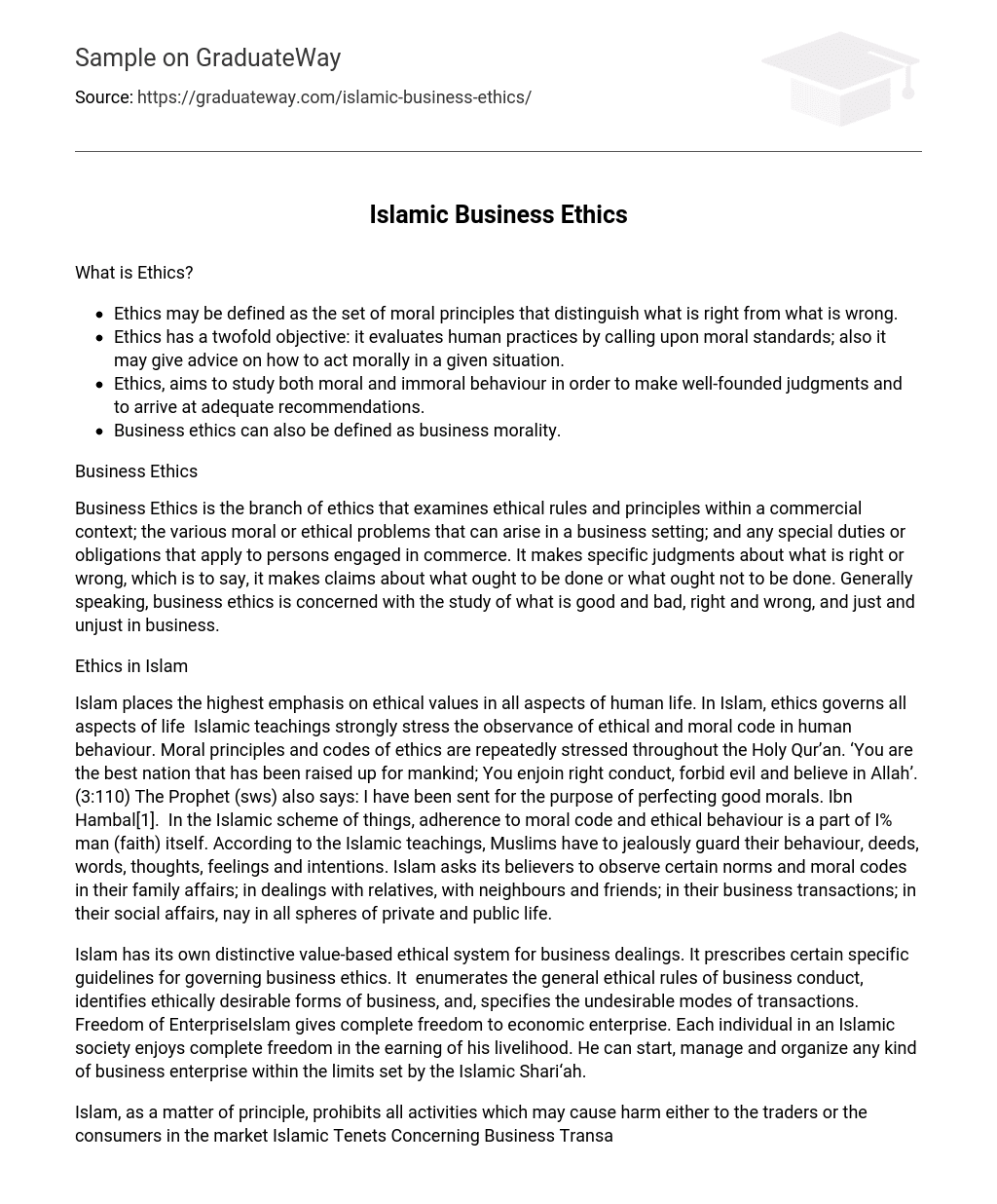What is Ethics?
- Ethics may be defined as the set of moral principles that distinguish what is right from what is wrong.
- Ethics has a twofold objective: it evaluates human practices by calling upon moral standards; also it may give advice on how to act morally in a given situation.
- Ethics, aims to study both moral and immoral behaviour in order to make well-founded judgments and to arrive at adequate recommendations.
- Business ethics can also be defined as business morality.
Business Ethics
Business Ethics is the branch of ethics that examines ethical rules and principles within a commercial context; the various moral or ethical problems that can arise in a business setting; and any special duties or obligations that apply to persons engaged in commerce. It makes specific judgments about what is right or wrong, which is to say, it makes claims about what ought to be done or what ought not to be done. Generally speaking, business ethics is concerned with the study of what is good and bad, right and wrong, and just and unjust in business.
Ethics in Islam
Islam places the highest emphasis on ethical values in all aspects of human life. In Islam, ethics governs all aspects of life Islamic teachings strongly stress the observance of ethical and moral code in human behaviour. Moral principles and codes of ethics are repeatedly stressed throughout the Holy Qur’an. ‘You are the best nation that has been raised up for mankind; You enjoin right conduct, forbid evil and believe in Allah’. (3:110) The Prophet (sws) also says: I have been sent for the purpose of perfecting good morals. Ibn Hambal[1]. In the Islamic scheme of things, adherence to moral code and ethical behaviour is a part of I% man (faith) itself. According to the Islamic teachings, Muslims have to jealously guard their behaviour, deeds, words, thoughts, feelings and intentions. Islam asks its believers to observe certain norms and moral codes in their family affairs; in dealings with relatives, with neighbours and friends; in their business transactions; in their social affairs, nay in all spheres of private and public life.
Islam has its own distinctive value-based ethical system for business dealings. It prescribes certain specific guidelines for governing business ethics. It enumerates the general ethical rules of business conduct, identifies ethically desirable forms of business, and, specifies the undesirable modes of transactions. Freedom of EnterpriseIslam gives complete freedom to economic enterprise. Each individual in an Islamic society enjoys complete freedom in the earning of his livelihood. He can start, manage and organize any kind of business enterprise within the limits set by the Islamic Shari‘ah.
Islam, as a matter of principle, prohibits all activities which may cause harm either to the traders or the consumers in the market Islamic Tenets Concerning Business Transactions Islam demands a certain type of behaviour from the economic agents – the consumers and the producers. The behaviour prescribed for the economic units is for leading a happy state of affairs, which is the ultimate goal of Islam. There are a number of rules of ethical discipline in Islamic commercial transactions without which business contract would be regarded as lacking perfection in the light of the code of good manners, decency and ethical excellence.
Islamic teachings require a Muslim trader to keep up his trusts, promises and contracts. Fair Treatment of WorkersProhibited Matters in Business Transactions Dealing in Prohibited (Haram) Items Sale of Al-Gharar (Uncertainty, Risks, Speculation). Arbitrarily Fixing the Prices Hoarding of FoodstuffThe Arabic word for hoarding is Ihtikar. It means storing foodstuffs or withholding them in expectation of rise in their prices. Cheating and Fraud in Business Transactions SwearingThe traders often take recourse to swearing to emphasize that their items are of good quality. Dealing in Stolen GoodsConclusion: In modern times business ethics has become a major topic of discussion among business communities and other related organizations. Each and every society has evolved ethical and moral codes of conduct for business transactions The Islamic ethical codes, on the contrary are good for all times and absolute.





